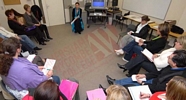Attention Deficit Hyperactivity Disorder
Attention Deficit Hyperactivity Disorder, ADHD, is a common mental health disorder in children. The three cardinal symptoms of ADHD are impulsiveness, hyperactivity and inattention. Nearly everyone shows some of these behaviors at times, but the symptoms lasts more than 6 months in ADHD. Impulsiveness means that the child acts too quickly without first thinking. Hyperactivity means the child cannot sit still. He or she walks, runs, or climbs around when others are seated and talks when others are talking. Inattention means the child’s mind wanders frequently from the task at hand. The child may start a line of thought or a task without completing it because the concentration does not last long enough.
Sometimes the symptoms of ADHD may at first look like normal behaviors. The symptoms usually start before the age of six. Children with ADHD may get distracted easily and forget things often. They may switch quickly from one activity to another, refuse to follow directions, daydream frequently, fail to finishing tasks such as house chores and homework, frequently lose toys, books, and school supplies, fidget and squirm, talk nonstop and interrupt others, run around a lot, touch and play with everything they see, blurt out inappropriate comments, and have trouble controlling their emotions.
There is no single test that can tell if a child has ADHD and so, it may take months for a doctor or other clinicians to know if the child has ADHD. Clinicians need time to observe the child for specific symptoms. Sometimes it can be difficult to diagnose a child with ADHD because symptoms may look like other problems. A child may seem quiet and well-behaved, but in fact he or she is having trouble paying attention. A child may act badly in school, but teachers don’t realize that the child has ADHD. So, if a child is frequently having trouble at school, the parent should let the child’s doctor know. Otherwise the symptoms will begin to affect the child’s functioning at home, school, and other social situations. And if untreated, ADHD can linger far into adolescence and adulthood. Any adults that think they may have ADHD should consult a doctor or clinician to be sure.
ADHD is more common in boys than girls, and affects 3 to 5 percent of children in the United States. If any parents or guardians suspect ADHD, they should have the child evaluated by a clinician such as a psychiatrist, nurse practitioner, psychologist, pediatrician, neurologist, or a clinical social worker. The clinician will try to rule out other possible reasons for the child’s behavior, check the child’s school and medical records, talk to the teachers, have the teacher and parents fill out a behavior rating scale for the child, and finally, come up with a diagnosis.
No one knows for sure what causes ADHD. However, since it runs in families, genetics may be a factor. Also, it is believed that there may be a combination of factors. Possible factors include lead from toys, old paint and plumbing; smoking and alcohol during pregnancy; brain injury; and food additives such as artificial coloring. Although some people think refined sugar may cause ADHD, not many research studies support that opinion.
ADHD can be treated. Treatment usually is a combination of medications and therapy. The medications usually help to control the symptoms. In addition, ADHD parenting classes and the use of behavior structure by parents at home and teachers at school can be quite helpful.
For other psychiatric mental health related articles, visit Dr. Omotosho’s website at



